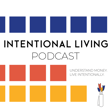
Money in Marriage: How to Talk About What Really Matters
In this episode of the Intentional Living FP Podcast, financial planners Jim Crider and Cade Grimm explore how money shapes marriage—not just through budgets, but through communication. Money isn’t only about math; it’s a language that reveals what you value most.
Jim and Cade unpack how financial stress, hidden spending, and misaligned priorities can quietly erode trust—but also how intentional conversations about money can strengthen connection, clarity, and peace. You’ll hear real-life stories of couples who turned conflict into understanding, and learn why regular financial communication makes couples 20–25% less likely to divorce.
They also challenge the comparison culture fueled by social media and offer a healthier perspective: you can have anything, but you can’t have everything.
If you’ve ever felt tension around money in your relationship, this episode will help you align your time, finances, and values—so your money story becomes one of teamwork, purpose, and intentional living.



